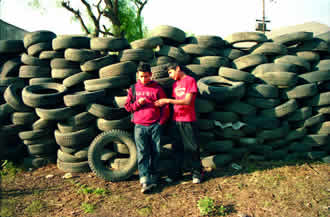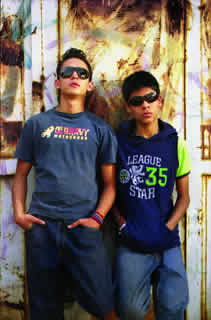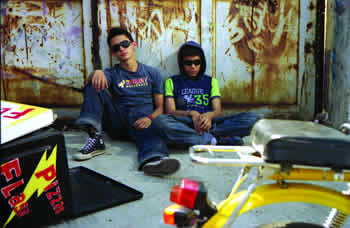 Born in 1972 in Chihuahua, Mexico. Between 1991 and 1996 Aaron Fernandez studied in Paris, France where he obtained a Master’s degree in cinematographic and audiovisual studies, specializing in directing and screen writing.
Born in 1972 in Chihuahua, Mexico. Between 1991 and 1996 Aaron Fernandez studied in Paris, France where he obtained a Master’s degree in cinematographic and audiovisual studies, specializing in directing and screen writing.
Partes usadas (Used Parts) (2007)
Corrido callejero (Rambling Ballad) (2005) – Short
Circuito interior (Inner Circuit) (2000) – Short
Argent liquide (Easy Money) (1997) – Short
Le partage des eaux (The Sharing of the Waters ) (1995) – Short
Used parts is the story of the life of Ivan, a 14-year old boy, that lives with his uncle Jaime, a mediocre dealer of used car parts. Both of them dream with a better life and are stashing away their money in order to immigrate illegally to Chicago shortly. When Jaime realizes that he needs much more money than he expected in order to pay the “Coyote” that will help them cross the border, he decides to introduce his nephew into the world of car-part theft. Ivan learns quickly the know-how of his new trade and convinces Efrain, his best friend, to help him. The
dealer of used car parts. Both of them dream with a better life and are stashing away their money in order to immigrate illegally to Chicago shortly. When Jaime realizes that he needs much more money than he expected in order to pay the “Coyote” that will help them cross the border, he decides to introduce his nephew into the world of car-part theft. Ivan learns quickly the know-how of his new trade and convinces Efrain, his best friend, to help him. The
kids enjoy themselves together and carry out Jaime’s orders skillfully until Ivan realizes that his uncle’s intentions for the trip have changed since they first made their plans.
Cinema Without Borders: How did you come up with the idea of making Used Parts?
Aaron Fernandez: The world of car parts always fascinated me and I thought it was of great cinematographic interest, visually speaking.  I also wanted to create a tale full of life and energy, with real and deep characters. The stories that I want to shoot always start with the idea of a strong character, so one day I had the idea of this two kids, Ivan and Efrain, who were involved in this world of dealing car parts, and it seemed to me that it could shape into an interesting film.
I also wanted to create a tale full of life and energy, with real and deep characters. The stories that I want to shoot always start with the idea of a strong character, so one day I had the idea of this two kids, Ivan and Efrain, who were involved in this world of dealing car parts, and it seemed to me that it could shape into an interesting film.
CWB: Used Parts introduces an unknown world to most of its audience in US, how real is the world of your film?
Aaron: It is based on real facts and characters; the world of car parts robbery exists from a long time in Mexico City. But even if the film is based on real facts, I didn’t wanted to make a sociological study of the case. The world of car parts is the context in which my characters develop but it is not really the subject of the film. The story is more about loyalty and treason that happen in the everyday life of common people, like my characters.
CWB: How did you choose your actors, are they professional actors or ordinary people playing themselves?
Aaron: I always wanted new faces for this film. I wanted my actors to be anonymous and real, but also spontaneous and sincere. Since the film relies on a naturalistic aesthetic, it seemed to me necessary to have a compromise with the characters and they needed to be common people, or at least behave so. Some of the actors are professionals but not stars, and some of them are ordinary people. That is the case of Eduardo Granados. Ivan is his first professional role ever. When we saw him, we where amazed by his presence and his huge energy, which is one of Ivan’s main traits.
CWB: Eduardo Granados playing Ivan does a magnificent job. How close Eduardo Granados is close to Ivan in real life and how did you help him to come with his performance?
his performance?
Aaron:: Eduardo’s life is not similar to Ivan’s, but they belong almost to the same social class. Eduardo could be Ivan in some way. In the acting work, I let him as free as possible, allowing his intuition to guide his characterization. I would only make sure that he would not overact or walk in a sense contrary to my expectations. In some scenes, especially those with both kids, I let them (and asked them) to improvise and be spontaneous. I thing the result is really satisfying. I really enjoyed to do it. I love to work with actors and non actors, and I have a deep respect for their work.
CWB: Alan Chavez as Efrain also does a beautiful job. He is very convincing and believable. Please tell us about his performance also. Aaron: Alan had already some acting experience, and after Used Parts he has worked in other movies. I followed with him the same directions that with Eduardo, with the only difference that I had to be more strict with Alan, because he was more distracted and, despite of his experience, took work in a more frivolous way. Alan has this wonderful ability to transform himself into the character in half a second, he is very intuitive.
Aaron: Alan had already some acting experience, and after Used Parts he has worked in other movies. I followed with him the same directions that with Eduardo, with the only difference that I had to be more strict with Alan, because he was more distracted and, despite of his experience, took work in a more frivolous way. Alan has this wonderful ability to transform himself into the character in half a second, he is very intuitive.
I knew that the film would reach a satisfying result only if the two kids worked as a complementary couple. In one of the callbacks I put several kids together, making some couples to see how they interacted between them. When I reunited Eduardo and Alan, I immediately knew I got my actors. I had Efrain and Ivan in front of me.
CWB: How did you come up with visual style of the Used Parts?
Aaron: I wanted it to be as natural as possible; the choice of natural light and real locations goes in that sense. The language of the camera movements obeys to the fact that I wanted it to be a vibrant film, with a dynamic rhythm, and a great agility.
We managed always the same colors (red, yellow, and green) to give the film a visual unity and a strong visual character.
CWB: What was the most challenging aspect of making Used parts?
Aaron: Making a film with a lot of locations, a lot of cars, and several characters in few time and with a very limited budget, and making it seem like a normal budget film.
CWB: What was the reaction of your young actors after watching Used Parts?
Aaron: They were really amazed, and happy. I think they sincerely liked it.
CWB: When will be the theatrical release of Used Parts in US?
Aaron: We already have a distributor for the US (24 Frames) but we still don’t have a date. Most probably it would be after the Mexican release that will likely take place in February 2008.

